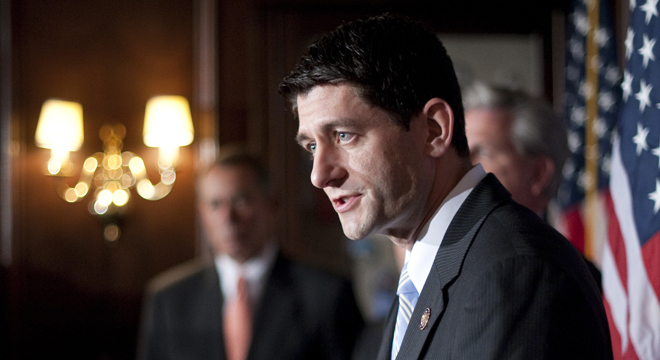Democrats were perhaps as excited by the selection of Rep. Paul Ryan as Republicans Saturday, boasting that Ryan will be a boon to their cause on every level.
Their reasoning: Mitt Romney is inextricably tied now to the architect of the GOP’s plan to privatize Medicare, and Ryan’s proposal to slash entitlements is guaranteed to receive more national attention than ever before.
“In naming Congressman Paul Ryan, Mitt Romney has chosen a leader of the House Republicans who shares his commitment to the flawed theory that new budget-busting tax cuts for the wealthy, while placing greater burdens on the middle class and seniors, will somehow deliver a stronger economy,” Obama campaign manager Jim Messina said in a statement Saturday morning.
The Obama campaign had already spent months trying to link Ryan and Romney together in voters’ minds, highlighting every statement from the Republican candidate in which he praised the House Republican budget Ryan created. Democratic officials routinely referred to the “Romney-Ryan” plan in interviews and campaign materials — now it’s the Romney-Ryan ticket.
Democrats suggested to TPM that Ryan’s pick represents a turning point they can exploit on two major fronts.
On the policy end, Ryan’s budget instantly adds meat to Romney’s skeleton of a tax and deficit plan, where the governor has been notoriously cautious about offering any specifics that might be politically damaging. While Romney has not indicated he will run on Ryan’s budget specifically, Democrats won’t care about the distinction in formulating their attacks.
Obama has made tax fairness central to his campaign, calling his opponent “Romney Hood” for proposing a plan that would, according to an independent analysis, shower $250,000 in tax cuts on the wealthiest Americans while raising taxes for 95 percent of Americans. Ryan’s plan, which calls for a new system with only two income tax rates, 10 percent and 25 percent, has been scored much the same way and costs an estimated $4.5 trillion.
On entitlements, Romney offered up a Medicare voucher plan, but offered no details as to how generous the vouchers would be, making it difficult to accuse him of slashing seniors benefits. Democrats will have no such problem with Ryan’s detailed Medicare plan, which the nonpartisan CBO estimates would require seniors to pay thousands of dollars more in out-of-pocket costs.
In addition to Medicare and taxes, Ryan’s budgets cuts to domestic spending could open Romney to microtargeted attacks. While the Ryan budget doesn’t offer line by line specifics, the campaign might try to reach students, teachers and parents with information on how cuts in Ryan’s plan might impact education spending and scholarship aid.
“Whenever you have draconian cuts to spending, you have a real-world impact on people that affects many demographics in different ways,” Ty Matsdorf, an operative for Democratic group American Bridge, which put together a 290-page opposition research paper on Ryan, told TPM. “It gives an opportunity to speak directly about how this election will effect them.”
On a broader scale, Democratic officials said Romney’s pick marks a decisive abandonment of any attempt to reach out to moderates and independents. The Obama campaign, ditching early attacks on Romney as a flip-flopper, has moved on to painting Romney as a tool of the far right. Some thought Romney might choose Sen. Marco Rubio (R-FL) and tack to the center on immigration to undercut this line of attack, or perhaps a non-threatening generic Republican like Tim Pawlenty. Instead, Romney is embracing congressional Republicans’ most influential player in the face of a major pressure campaign from leading conservative pundits.
“Just like Sen. John McCain’s choice of Sarah Palin and George H.W. Bush’s selection of Dan Quayle, Mitt Romney has been cowed by the right wing into choosing an extreme vice presidential nominee who will alienate moderate voters,” Neera Tanden, president of the Center for American Progress, said in a statement.
The renewed focus on the Ryan plan will also affect House and Senate races, where Democrats have tried to tie Republicans’ votes in favor of the plan around incumbent Republicans’ necks.
“Mitt Romney may do for House Democrats what hasn’t happened on its own, which is a national debate about the Republican budget that ends Medicare — thats a debate we win hands down,” one Democratic operative told TPM.
Democratic candidates like Rep. Kathy Hochul (D-NY), who won an upset special election focused on Ryan’s Medicare plan shortly after Republicans took over the House, are already jumping on the news.
“Just one year ago, western New York voters rejected the Ryan-Collins policies that would end Medicare as we know it and hurt middle class families while giving more tax cuts to the rich,” Hochul said in a statement. “Our country needs to move forward, not re-hash failed ideas.”









